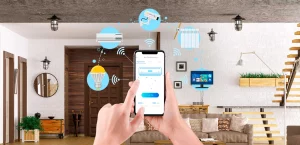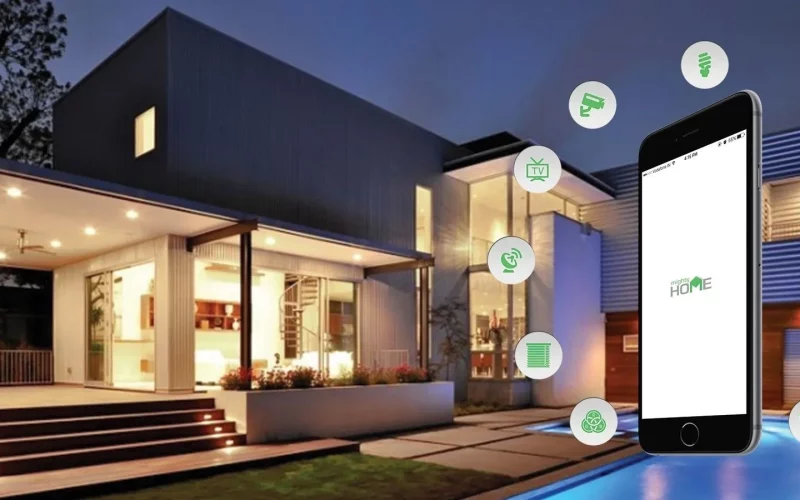In today’s world, smart home technology has transitioned from a luxury to an integral part of modern living. These connected devices are enhancing the convenience, security, and efficiency of homes in ways we never imagined. From energy savings to enhanced security, smart home systems are transforming everyday life, while also introducing new challenges, such as legal risks and cybersecurity threats.
This article explores the key aspects of smart home technology, including energy savings, home automation systems, the importance of interoperability, legal risks, and cybersecurity considerations. We’ll also provide examples, benefits, and practical insights to help you make informed decisions when integrating smart technology into your home.
Smart Home Energy Savings
One of the most significant advantages of smart home technology is its potential for energy savings. Smart thermostats, lighting systems, and plugs can help homeowners significantly reduce their energy consumption. These devices use automation to ensure that energy is used only when necessary, resulting in both environmental benefits and lower utility bills.
Examples of Energy-Saving Devices:
- Smart Thermostats (e.g., Nest, Ecobee): These devices can learn your habits and automatically adjust the temperature based on your routine. For example, they can lower the temperature when you’re not at home and adjust it to a comfortable level just before you return.
- Smart Lighting Systems (e.g., Philips Hue, LIFX): These lights can be scheduled to turn off when no one is in a room or adjust their brightness based on the time of day.
- Smart Plugs (e.g., TP-Link, Wemo): These devices allow you to control any plugged-in appliance remotely, ensuring that electronics are not left on unnecessarily.
Benefits of Smart Home Energy Savings:

- Reduced Energy Bills: Automating energy consumption based on your routine can result in significant savings.
- Environmental Impact: Less energy consumption reduces your carbon footprint, making smart homes more sustainable.
- Convenience: You no longer have to worry about manually adjusting settings. Everything happens automatically or at the touch of a button.
Home Automation Systems
Home automation systems are the backbone of smart home technology. These systems allow you to control various aspects of your home, such as lighting, temperature, security, and entertainment, all from a single interface. The most advanced systems offer seamless integration of different devices, creating a unified, smart home experience.
Examples of Home Automation Systems:
- Samsung SmartThings: A hub that allows users to control various smart devices from a single platform.
- Amazon Alexa: With voice-activated commands, Alexa can control lights, locks, and thermostats, and even order groceries.
- Google Home: Another popular hub that integrates with various IoT home devices, offering voice control and automation.
Benefits of Home Automation Systems:
- Convenience: Control all aspects of your home from your smartphone or with voice commands.
- Security: Automation can be applied to home security systems, ensuring that your home is always protected.
- Increased Home Value: Homes with automation systems are more attractive to potential buyers, increasing their market value.
IoT Home Devices
The Internet of Things (IoT) is a network of connected devices that communicate with each other to offer more seamless home control. From smart fridges that let you know when you’re low on groceries to security cameras that send real-time alerts, IoT devices are revolutionizing how we live.
Examples of IoT Home Devices:
- Smart Fridges (e.g., Samsung Family Hub): These can alert you when you’re out of key groceries or suggest recipes based on the contents of your fridge.
- Smart Doorbells (e.g., Ring, Nest Hello): These devices allow you to see who’s at your door and communicate with them, even if you’re not at home.
- Smart Security Cameras (e.g., Arlo, Blink): These cameras can monitor your home in real-time and send notifications to your phone if they detect unusual activity.
Benefits of IoT Home Devices:
- Efficiency: These devices can save you time by automating tasks such as ordering groceries or adjusting your thermostat remotely.
- Safety and Security: IoT devices can monitor your home and notify you of potential security risks.
- Cost Savings: IoT devices can reduce energy waste, as well as the costs associated with home maintenance.
Smart Home Legal Risks
With the rise of smart home technology, there are legal implications that homeowners and builders need to consider. Privacy concerns, product liability, and data security are among the top legal risks associated with smart home devices.
Examples of Legal Risks:
- Data Privacy Violations: Smart home devices collect a vast amount of data, which can be vulnerable to breaches or misuse. Companies that fail to secure this data can face legal action.
- Product Liability: If a smart home device malfunctions and causes damage (such as a smart lock failing and leading to a break-in), the manufacturer or installer could be held liable.
- Inconsistent Laws: Smart home laws are still developing, with different jurisdictions having varying regulations. Builders and homeowners need to stay informed about the legal landscape.
Benefits of Understanding Legal Risks:
- Informed Decisions: Understanding the risks helps homeowners and builders make smarter choices about which devices to install.
- Protection from Liability: By using high-quality products and ensuring proper installation, builders and homeowners can reduce their liability.
- Data Security: Ensuring that devices comply with data protection laws reduces the risk of privacy breaches.
Connected Home Security
As smart homes become more connected, security becomes a top priority. Cybersecurity in smart homes is essential, as poorly secured devices can be hacked, leading to data breaches or unauthorized control of your home systems.
Examples of Smart Home Security Devices:
- Smart Locks (e.g., August, Schlage): These locks allow you to control your home’s entry points remotely. You can lock or unlock doors using your smartphone, and even grant temporary access to visitors.
- Smart Security Systems (e.g., ADT, Vivint): These systems integrate various security devices like cameras, alarms, and motion detectors, providing comprehensive protection.
Benefits of Connected Home Security:
- Remote Access: Monitor and control your security system from anywhere.
- Enhanced Safety: Smart security systems provide real-time alerts and can deter potential intruders.
- Integration with Other Devices: Smart security systems can integrate with other devices, such as smart lights, to create a fully secure home.
Smart Home Device Interoperability

Interoperability refers to the ability of different smart devices to work together seamlessly. As the number of IoT devices in homes increases, ensuring that all these devices communicate effectively is critical for a smooth smart home experience.
Examples of Interoperability Solutions:
- Matter Protocol: A universal standard that ensures smart devices from different manufacturers can communicate with each other.
- IFTTT (If This Then That): A free platform that allows different smart devices to work together, even if they come from different manufacturers.
Benefits of Interoperability:
- Seamless Integration: All your devices work together without compatibility issues.
- Easier Control: Manage multiple devices from a single interface or hub.
- Future-Proofing: Interoperability ensures that your system can accommodate new devices as they enter the market.
Cybersecurity in Smart Homes
Cybersecurity is one of the biggest concerns in modern smart homes. With so many devices connected to the internet, the risk of hacking increases. Ensuring that your home’s network and devices are secure is essential to protecting your privacy and safety.
Examples of Cybersecurity Threats:
- Device Hacking: Hackers can gain control of smart home devices, such as security cameras or smart locks, putting homeowners at risk.
- Data Breaches: IoT devices collect vast amounts of personal data, which can be vulnerable to cyberattacks.
Benefits of Securing Your Smart Home:
- Protection from Cyberattacks: Strong cybersecurity measures can protect your home from being hacked.
- Data Privacy: Ensuring that your devices are secure prevents sensitive data from being stolen or misused.
- Peace of Mind: Knowing your smart home is protected gives you peace of mind, allowing you to enjoy the benefits without worry.
Voice Control in Smart Home Systems
Voice control has become a popular feature in smart homes, allowing users to control devices using simple voice commands. Popular voice assistants like Amazon Alexa, Google Assistant, and Apple Siri make it easier than ever to control your home.
Examples of Voice-Controlled Devices:
- Smart Speakers (e.g., Amazon Echo, Google Nest): These devices allow users to control various aspects of their home, such as lighting, temperature, and security, with voice commands.
- Smart TVs (e.g., Samsung Smart TV, LG OLED): Control your TV and other entertainment systems using voice commands.
Benefits of Voice Control:
- Hands-Free Operation: Voice control allows you to operate devices without needing to physically interact with them.
- Accessibility: Voice control makes smart home technology more accessible for people with disabilities.
- Convenience: Quickly adjust settings without reaching for a remote or smartphone.
Smart Home Hub Installation
A smart home hub acts as the control center for all your connected devices, ensuring seamless communication between them. The hub can either be a dedicated device or built into a voice assistant like Alexa or Google Home.
Examples of Smart Home Hubs:
- Samsung SmartThings Hub: Integrates various smart devices into one platform.
- Apple HomePod: Allows users to control Apple-compatible devices with Siri voice commands.
Benefits of Smart Home Hub Installation:
- Centralized Control: Manage all your devices from a single app or hub.
- Interconnectivity: Hubs ensure that different devices from different manufacturers work together seamlessly.
- Future Expansion: Hubs can be expanded with new devices, allowing your smart home system to grow over time.
Smart Lighting and Plugs for Home Automation
Smart lighting and plugs are among the most practical and cost-effective smart home solutions. These devices allow you to automate your lighting and control other appliances remotely, enhancing both convenience and energy efficiency.
Examples of Smart Lighting and Plugs:
- Philips Hue Smart Lights: Control the brightness, color, and scheduling of your lights using a smartphone app or voice commands.
- Wemo Smart Plugs: Automate any appliance by plugging it into a smart plug, allowing you to control it remotely.
Benefits of Smart Lighting and Plugs:
- Energy Efficiency: Automating your lights and plugs ensures they are only used when necessary, reducing energy waste.
- Convenience: Control your lights and appliances remotely or on a schedule, adding convenience to your daily life.
- Customization: Create different lighting scenes for different activities, such as reading, relaxing, or entertaining.
Conclusion
Smart home technology offers numerous benefits, from energy savings and enhanced security to convenience and increased home value. However, it also introduces new challenges, such as legal risks and cybersecurity concerns. By understanding the key aspects of smart home systems—including device interoperability, home automation, and cybersecurity—you can make informed decisions that will enhance your living experience while protecting your home and data. As smart technology continues to evolve, staying informed and proactive is the key to maximizing the benefits of a connected home.












